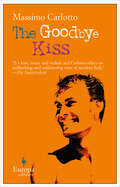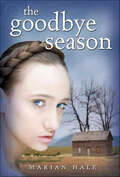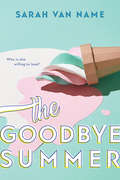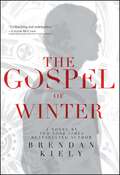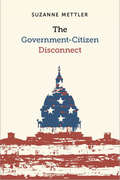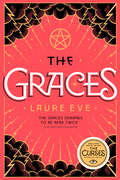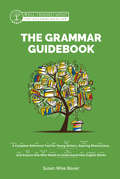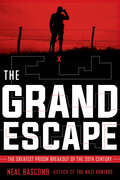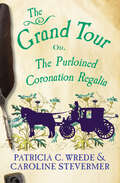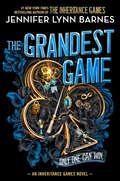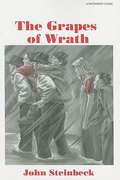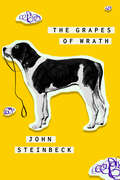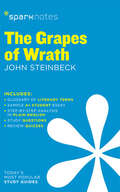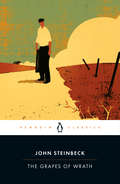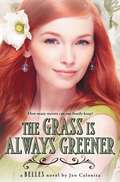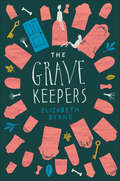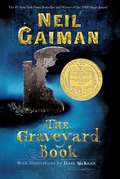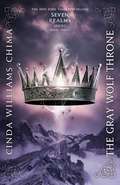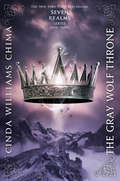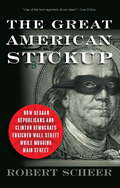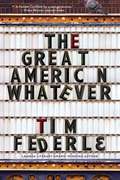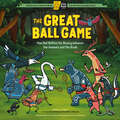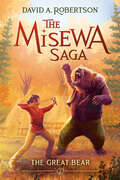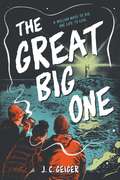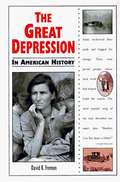- Table View
- List View
The Goodbye Kiss
by Massimo CarlottoAn unscrupulous womaniser, as devoid of morals as he once was full of idealistic fervour, returns to Italy where he is wanted for a series of political crimes. To avoid prison he sells out his old friends, turns his back on former ideals and cuts deals with crooked cops. To achieve the guise of respectability he is willing to go even further, perhaps even as far as murder. It's lean, mean and violent and Carlotto offersan unflinching and unflattering view of modernItaly. - The Independent
The Goodbye Season
by Marian HaleA courageous young woman comes of age in the midst of an historical tragedy, from the author of Dark Water Rising.Mercy Kaplan doesn't want to be like her mother, saddled with crying kids and failing crops for the rest of her life. Mercy longs to be on her own—until her wish comes true in the worst possible way. It is 1918 and a deadly flu epidemic ravages the country, leaving her utterly alone and penniless. Mercy soon finds a job with Mrs. Wilder. But there's something unsettling about the woman, whose brother died under mysterious circumstances. And then there's Daniel, who could sweep a girl off her feet if she isn't careful.“The history—of the epidemic and of early feminism—creates a dramatic story, and Mercy’s personal struggle for independence is universal.” —Booklist“Mercy tells her story in a gentle, cadenced voice filled with youthful hope, simple wisdom and gritty endurance. Perfect similes capture the flavor of Mercy's bittersweet life during the epidemic of 1918.” —Kirkus Reviews
The Goodbye Summer
by Sarah Van NameSarah Dessen meets Morgan Matson in the perfect summer debut about learning to say goodbye—or finding a reason to stayCaroline is counting the days until September, when she'll turn seventeen and she and her older boyfriend, Jake, will run away together. She doesn't feel connected to anyone at home now that she has him, and she can't wait to see the world with the most important person in her life. So with just a few more months until freedom, she spends her summer working at the local aquarium gift shop and dreaming of the fall. Then she meets Georgia, a counselor at the aquarium's camp, and Caroline's world changes. Through pizza lunches, trips to amusement parks, and midnight talks, Georgia begins to show Caroline there's more to life than being with Jake. The stronger Georgia and Caroline's bond grows, the more uneasy Caroline becomes about her plans to leave. When summer comes to a close, she'll have to say goodbye to someone...but who is she willing to lose?
The Gospel of Winter: A Novel
by Brendan Kiely“In a lyrical and hard-hitting exploration of betrayal and healing, the son of a Connecticut socialite comes to terms with his abuse at the hands of a beloved priest” (Kirkus Reviews, starred review).As sixteen-year-old Aidan Donovan’s fractured family disintegrates around him, he searches for solace in a few bumps of Adderall, his father’s wet bar, and the attentions of his local priest, Father Greg—the only adult who actually listens to him. When Christmas hits, Aidan’s world collapses in a crisis of trust when he recognizes the darkness of Father Greg’s affections. He turns to a crew of new friends to help make sense of his life: Josie, the girl he just might love; Sophie, who’s a little wild; and Mark, the charismatic swim team captain whose own secret agonies converge with Aidan’s. The Gospel of Winter maps the ways love can be used as a weapon against the innocent—but can also, in the right hands, restore hope and even faith. Brendan Kiely’s unflinching and courageous debut novel exposes the damage from the secrets we keep and proves that in truth, there is power. And real love.
The Government-Citizen Disconnect
by Suzanne MettlerAmericans’ relationship to the federal government is paradoxical. Polls show that public opinion regarding the government has plummeted to all-time lows, with only one in five saying they trust the government or believe that it operates in their interest. Yet, at the same time, more Americans than ever benefit from some form of government social provision. Political scientist Suzanne Mettler calls this growing gulf between people’s perceptions of government and the actual role it plays in their lives the "government-citizen disconnect." In The Government-Citizen Disconnect, she explores the rise of this phenomenon and its implications for policymaking and politics. Drawing from original survey data which probed Americans’ experiences of 21 federal social policies -- such as food stamps, Social Security, Medicaid, and the home mortgage interest deduction -- Mettler shows that 96 percent of adults have received benefits from at least one of them, and that the average person has utilized five. Overall usage rates transcend social, economic, and political divisions, and most Americans report positive experiences of their policy experiences. However, the fact that they have benefited from these policies has little positive effect on people’s attitudes toward government. Mettler finds that shared identities and group affiliations, as well as ideological forces, are more powerful and consistent influences. In particular, those who oppose welfare tend to extrapolate their unfavorable views of it to government in general. Deep antipathy toward the government has emerged as the result of a conservative movement that has waged a war on social welfare policies for over forty years, even as economic inequality and benefit use have increased. Mettler finds that voting patterns exacerbate the government-citizen disconnect, as those holding positive views of federal programs and supporting expanded benefits have lower rates of political participation than those holding more hostile views of the government. As a result, the loudest political voice belongs to those who have benefited from policies but who give government little credit for their economic well-being, seeing their success more as a matter of their own deservingness. This contributes to the election of politicians who advocate cutting federal social programs. According to Mettler, the government-citizen disconnect frays the bonds of representative government and democracy. The Government-Citizen Disconnect illuminates a paradox that increasingly shapes American politics. Mettler's examination of hostility toward government at a time when most Americans will at some point rely on the social benefits it provides helps us better understand the roots of today's fractious political climate.
The Graces: A Graces Novel (The Graces Novels)
by Laure EveEveryone loves the Graces. Fenrin, Thalia, and Summer Grace are attractive, rich, and glamorous, and they’ve cast a spell over their high school—and their entire town. They’re also rumored to have powerful connections all over the world. If you’re not in love with one of them, you want to be one of them. This is especially true for River: the new girl at school. River’s different from the rest of the horde that both revere and fear the Grace family. She’s dark, aloof, and just maybe . . . magical. And she wants to be a Grace more than anything. But what the Graces don’t know is that River’s presence in their town is no accident. The first rule of witchcraft is that if you want something bad enough, you can get it . . . no matter who has to pay.
The Grammar Guidebook: A Complete Reference Tool For Young Writers, Aspiring Rhetoricians, And Anyone Else Who Needs To Understand How English Works (Grammar for the Well-Trained Mind #0)
by Susan Wise BauerOn its own or as a supplement to the Grammar for the Well-Trained Mind program, this complete compendium of grammar rules and examples will become an indispensable guide to writing—throughout high school, into college, and beyond. With a new name, but the same, thorough, clearly-outlined rules of English Grammar, The Grammar Guidebook is the second edition to The Comprehensive Handbook of Rules. Originally designed to accompany the Grammar for the Well-Trained Mind program, this Grammar Guidebook stands on its own, assembling into one handy reference work all of the principles that govern the English language—from basic definitions (“A noun is the name of a person, place, thing, or idea”) through advanced sentence structure and analysis. Each rule is illustrated with examples drawn from great literature, along with classic and contemporary works of science, history, and mathematics. Grammar for the Well-Trained Mind is an innovative program that combines the three essential elements of language learning: understanding and memorizing rules (prescriptive teaching), repeated exposure to examples of how those rules are used (descriptive instruction), and practice using those rules in exercises and in writing (practical experience). Each year, parents and teachers go through the dialogue, rules, and examples in the Core Instructor Text; students follow along in the Student Workbook. This repetition solidifies the concepts, definitions, and examples in the student’s mind. There are four Student Workbooks, one for each year. Each Student Workbook contains the same rules and examples—but four completely different sets of exercises and assignments, allowing students to develop a wide-ranging knowledge of how the rules and examples are put to use in writing. Each Student Workbook comes with its own Key, providing not only answers, but also explanations for the parent/instructor, and guidance as to when the answers might be ambiguous (as, in English, they often are). All of the rules covered, along with the repeated examples for each, are assembled for ongoing reference in The Grammar Guidebook. Use Grammar for the Well-Trained Mind to teach English grammar thoroughly, effectively, and with confidence—no matter what your background or experience!
The Grand Escape: The Greatest Prison Breakout of the 20th Century
by Neal Bascomb“A grand adventure,” this story of the Allied POWs who staged one of history’s greatest escapes from prison camp is “narrative non-fiction at its finest” (Booklist).At the height of World War I, as battles raged in the trenches and in the air, another struggle for survival was being waged in the most notorious POW camp in all of Germany: Holzminden. A land-locked Alcatraz of sorts, it was home to the most troublesome Allied prisoners—and the most talented at escape. The Grand Escape tells the remarkable tale of a band of pilots who pulled off an ingenious plan and made it out of enemy territory in the biggest breakout of WWI, inspiring their countrymen in the darkest hours of the war. “Page-turning suspense and colorful detail. . . . ” —Booklist, starred review“Suspenseful reading . . . A fine escapade.” —Kirkus Reviews, starred review “A fantastic pick for avid history readers.” —School Library Journal, starred review
The Grand Tour: Or, The Purloined Coronation Regalia (The Cecelia and Kate Novels #2)
by Patricia C. Wrede Caroline StevermerTwo young Regency ladies with special powers must save the monarchy: &“A satisfying blend of magic, mystery, humor, and romance&” (Booklist). Ocean voyages do not agree with wizards, and seasickness during the Channel crossing is the price Cecelia must pay for her budding magical skill. As her nausea ebbs, she is comforted by her new husband, James, and the knowledge that at long last they are on their honeymoon. In their company is Cecelia&’s cousin Kate, newly minted as the Marchioness of Schofield, and her husband, Thomas. The shared journey guarantees the two couples a happy start to married life, if they can survive the perils of the Continent. In Calais, a mysterious woman visits Cecelia with a package intended for Thomas&’s mother. Inside is an alabaster flask of noble manufacture, one of the royal artifacts that have been vanishing all over Europe as part of a magical plot against the French crown. This is no simple honeymoon: On their tour of Europe, Kate and Cecelia must save the monarchy from an emperor-in-exile named Napoleon. This ebook features illustrated biographies of Patricia C. Wrede and Caroline Stevermer including rare photos and never-before-seen documents from the authors&’ personal collections.
The Grandest Game (The Grandest Game #1)
by Jennifer Lynn BarnesGet ready for a new series that brings readers deeper into the lush, romantic, and puzzle-filled world of the #1 bestselling Inheritance Games series (over 5 million copies sold!), set a year after we last saw Avery and the Hawthornes.Seven tickets. An island of dreams. The chance of a lifetime. Welcome to the Grandest Game, an annual competition run by billionaire Avery Grambs and the four infamous Hawthorne brothers, whose family fortune she inherited. Designed to give anyone a shot at fame and fortune, this year&’s game requires one of seven golden tickets to enter. With millions on the line, those seven players will do whatever it takes to win. Some of the players are in it for the money. Some for power. Some for reasons all their own. Every single one of them has secrets. Amidst it all is Grayson Hawthorne, tasked with a vital role in this year&’s game. But as tensions rise and the mind-bending challenges push the players to their limits—physically, mentally, and emotionally—it soon becomes clear that not everyone is playing by the rules.#1 New York Times bestselling author Jennifer Lynn Barnes delivers a new series in the world of The Inheritance Games, where fan-favorite and new characters collide in a game you&’ll never forget.Do you have what it takes to play?***Don&’t miss a moment of The Inheritance Games Saga, including the Grandest Game, the thrilling new series set in the world of the Inheritance Games. Reading them all? The ideal reading order is: The Inheritance Games, The Hawthorne Legacy, The Final Gambit, The Brothers Hawthorne, The Grandest Game, Games Untold, and Glorious Rivals. Looking for more unputdownable reads from Jennifer Lynn Barnes? Check out The Naturals series (The Naturals, Killer Instinct, All In, Bad Blood, and the enovella, Twelve), The Debutantes duet (Little White Lies, Deadly Little Scandals), and The Lovely and the Lost.
The Grapes of Wrath (Adapted)
by John Steinbeck Tony Napoli"Traces the migration of an Oklahoma Dust Bowl family to California and their subsequent hardships as migrant farm workers."--Amazon.com. Adapted and abridged.
The Grapes of Wrath (Globe's Adapted Classics)
by John SteinbeckAn epic human drama depicting the devastating effects of the Great Depression, The Grapes of Wrath won both the National Book Award and the Pulitzer Prize, cementing its place as the most American of American classics. First published in 1939, Steinbeck&’s novel chronicles the Dust Bowl migration of the 1930s and tells the story of one Oklahoma farm family, the Joads, driven from their homestead and forced to travel west to the promised land of California. Out of their repeated collisions with hard realities of an America divided into the Haves and Have-Nots evolves a drama intensely human and yet magnificent in scale and moral. An evocative portrait of the conflict between powerful and powerless, of one man&’s fierce reaction to injustice, and of one woman&’s stoical strength, The Grapes of Wrath probes into the very nature of equality and justice in America. Penguin Random House Canada is proud to bring you classic works of literature in e-book form, with the highest quality production values. Find more today and rediscover books you never knew you loved.
The Grapes of Wrath SparkNotes Literature Guide (SparkNotes Literature Guide Series #28)
by SparkNotesThe Grapes of Wrath SparkNotes Literature Guide by John Steinbeck Making the reading experience fun! When a paper is due, and dreaded exams loom, here's the lit-crit help students need to succeed! SparkNotes Literature Guides make studying smarter, better, and faster. They provide chapter-by-chapter analysis; explanations of key themes, motifs, and symbols; a review quiz; and essay topics. Lively and accessible, SparkNotes is perfect for late-night studying and paper writing. Includes:An A+ Essay—an actual literary essay written about the Spark-ed book—to show students how a paper should be written.16 pages devoted to writing a literary essay including: a glossary of literary termsStep-by-step tutoring on how to write a literary essayA feature on how not to plagiarize
The Grapes of Wrath: Sparknotes Literature Guide (Penguin Audio Classics Ser. #28)
by John Steinbeck Robert DemottThe Pulitzer Prize-winning epic of the Great Depression, a book that galvanized--and sometimes outraged--millions of readers.<P><P> First published in 1939, Steinbeck's Pulitzer Prize-winning epic of the Great Depression chronicles the Dust Bowl migration of the 1930s and tells the story of one Oklahoma farm family, the Joads-driven from their homestead and forced to travel west to the promised land of California. Out of their trials and their repeated collisions against the hard realities of an America divided into Haves and Have-Nots evolves a drama that is intensely human yet majestic in its scale and moral vision, elemental yet plainspoken, tragic but ultimately stirring in its human dignity.<P> A portrait of the conflict between the powerful and the powerless, of one man's fierce reaction to injustice, and of one woman's stoical strength, the novel captures the horrors of the Great Depression and probes into the very nature of equality and justice in America.<P> <i>The Grapes of Wrath</i> summed up its era in the way that Uncle Tom's Cabin summed up the years of slavery before the Civil War. Sensitive to fascist and communist criticism, Steinbeck insisted that "The Battle Hymn of the Republic" be printed in its entirety in the first edition of the book--which takes its title from the first verse: "He is trampling out the vintage where the grapes of wrath are stored." At once a naturalistic epic, captivity narrative, road novel, and transcendental gospel, Steinbeck's powerful landmark novel is perhaps the most American of American Classics.<P> This edition contains an introduction and notes by Steinbeck scholar Robert Demott.
The Grass Is Always Greener (Belles #3)
by Jen CalonitaWho says you can't choose your family? Their shared sweet sixteen party is just around the corner, and half sisters Isabelle Scott and Mirabelle Monroe are ready to cut loose, even if they are the daughters of a prominent public figure. So when Izzie's estranged aunt, Zoe, breezes into town unannounced, it just might be the change that the Monroe family needs -- or not, depending on who you ask...Happy with her cute surfer boyfriend and a group of great girlfriends, Izzie has no interest in getting to know yet another long-lost family member. But Mira, who's on a mission to try new things and meet new people -- a handsome brooding painter in particular -- is drawn to Izzie's artsy aunt, who seems to the be the polar opposite of the uptight Monroe family.As the girls try to negotiate the unexpected paths their lives have taken, Zoe's laid-back attitude eventually charms them both. But when Zoe offers Izzie the chance to leave Emerald Cove and start fresh in California, Izzie and Mira are faced with bigger changes than they expected. Is a move to the West Coast what Izzie had in mind for her sweet sixteen?The heartwarming conclusion to Jen Calonita's Belles trilogy.
The Grave Keepers
by Elizabeth ByrneLately, sixteen-year-old Athena Windham has been spending all her spare time in her grave.Her parents—owners of a cemetery in Upstate New York—are proud of her devoutness, but her thirteen-year-old sister, Laurel, can’t understand it. Laurel hates her own grave. It’s so boring and chilly down there. She’d rather spend her time exploring the acres and acres of state forest that surround the Windhams’ property.The Windham girls lead pretty secluded lives—their older sister died in a tragic accident the year before Laurel was born, and their parents’ protectiveness has made the family semi-infamous in their small town.As the new school year begins, the outside world comes creeping in. Athena—a professional high school loner—grapples with a newfound enemy and, even more surprising, her first best friend. And homeschooled Laurel, sheltered and shy, finds herself face-to-face with a runaway boy who’s hiding out in an abandoned grave.All the while, a ghost hangs around the Windham house and cemetery—the only grave keeper never to cross over, as far as she knows—messing with people’s graves, turning the Windhams’ lights off and on, spying on the sisters, and plotting how to keep the girls close to home and close to her . . . forever.The Grave Keepers is a unique coming-of-age story from talented debut author Elizabeth Byrne.
The Graveyard Book
by Neil Gaiman Dave MckeanIn this Newbery Medal-winning novel, Bod is an unusual boy who inhabits an unusual place — he's the only living resident of a graveyard. Raised from infancy by the ghosts, werewolves, and other cemetery denizens, Bod has learned the antiquated customs of his guardians' time as well as their ghostly teachings — such as the ability to Fade so mere mortals cannot see him.<P><P> Can a boy raised by ghosts face the wonders and terrors of the worlds of both the living and the dead? And then there are being such as ghouls that aren't really one thing or the other.<P> The Graveyard Book won the Newbery Medal and the Carnegie Medal, and is also a Hugo Award Winner for Best Novel.
The Gray Wolf Throne (Seven Realms #3)
by Cinda Williams ChimaHan Alister thought he had already lost everyone he loved. But when he finds his friend Rebecca Morley near death in the Spirit Mountains, Han knows that nothing matters more than saving her. The costs of his efforts are steep, but nothing can prepare him for what he soon discovers: the beautiful, mysterious girl he knew as Rebecca is none other than Raisa ana'Marianna, heir to the Queendom of the Fells. Han is hurt and betrayed. He knows he has no future with a blueblood. And, as far as he's concerned, the princess's family as good as killed his own mother and sister. But if Han is to fulfill his end of an old bargain, he must do everything in his power to see Raisa crowned queen. <P> Meanwhile, some people will stop at nothing to prevent Raisa from ascending. With each attempt on her life, she wonders how long it will be before her enemies succeed. Her heart tells her that the thief-turned-wizard Han Alister can be trusted. She wants to believe it-he's saved her life more than once. But with danger coming at her from every direction, Raisa can only rely on her wits and her iron-hard will to survive-and even that might not be enough.<P> The Gray Wolf Throne is an epic tale of fierce loyalty, unbearable sacrifice, and the heartless hand of fate.
The Gray Wolf Throne: Collecting The Demon King, The Exiled Queen, The Gray Wolf Throne, And The Crimson Crown (A Seven Realms Novel #3)
by Cinda Williams ChimaHan Alister thought he had already lost everyone he loved. But when he finds his friend Rebecca Morley near death in the Spirit Mountains, Han knows that nothing matters more than saving her. The costs of his efforts are steep, but nothing can prepare him for what he soon discovers: the beautiful, mysterious girl he knew as Rebecca is none other than Raisa ana'Marianna, heir to the Queendom of the Fells. Han is hurt and betrayed.
The Great American Stickup: How Reagan Republicans and Clinton Democrats Enriched Wall Street While Mugging Main Street
by Robert ScheerInThe Great American Stickup, celebrated journalist Robert Scheer uncovers the hidden story behind one of the greatest financial crimes of our time: the Wall Street financial crash of 2008 and the consequent global recession. Instead of going where other journalists have gone in search of this story-the board rooms and trading floors of the big Wall Street firms-Scheer goes back to Washington, D. C. , a veritable crime scene, beginning in the 1980s, where the captains of the finance industry, their lobbyists and allies among leading politicians destroyed an American regulatory system that had been functioning effectively since the era of the New Deal. This is a story largely forgotten or overlooked by the mainstream media, who wasted more than two decades with their boosterish coverage of Wall Street. Scheer argues that the roots of the disaster go back to the free-market propaganda of the Reagan years and, most damagingly, to the bipartisan deregulation of the banking industry undertaken with the full support of “progressive” Bill Clinton. In fact, if this debacle has a name, Scheer suggests, it is the “Clinton Bubble,” that era when the administration let its friends on Wall Street write legislation that razed decades of robust financial regulation. It was Wall Street and Democratic Party darling Robert Rubin along with his clique of economist super-friends-Alan Greenspan, Lawrence Summers, and a few others-who inflated a giant real estate bubble by purposely not regulating the derivatives market, resulting in the pain and hardship millions are experiencing now. The Great American Stickupis both a brilliant telling of the story of the Clinton financial clique and the havoc it wrought-informed by whistleblowers such as Brooksley Born, who goes on the record for Scheer-and an unsparing anatomy of the American business and political class. It is also a cautionary tale: those who form the nucleus of the Clinton clique are now advising the Obama administration.
The Great American Whatever
by Tim Federle<p>From the award-winning author of <i>Five, Six, Seven, Nate!</i> and <i>Better Nate Than Ever</i> comes "a Holden Caulfield for a new generation" (Kirkus Reviews, starred review). <p>Quinn Roberts is a sixteen-year-old smart aleck and Hollywood hopeful whose only worry used to be writing convincing dialogue for the movies he made with his sister Annabeth. Of course, that was all before--before Quinn stopped going to school, before his mom started sleeping on the sofa...and before the car accident that changed everything. <p>Enter: Geoff, Quinn's best friend who insists it's time that Quinn came out--at least from hibernation. One haircut later, Geoff drags Quinn to his first college party, where instead of nursing his pain, he meets a guy--okay, a hot guy--and falls, hard. What follows is an upside-down week in which Quinn begins imagining his future as a screenplay that might actually have a happily-ever-after ending--if, that is, he can finally step back into the starring role of his own life story.
The Great Ball Game: How Bat Settles the Rivalry between the Animals and the Birds; A Circle Round Book (Circle Round)
by Rebecca SheirA classic folktale with roots in the traditional stories of many Indigenous peoples in North America, The Great Ball Game is adapted for today's kids by Rebecca Sheir, host of the award-winning Circle Round podcast. The stunning art of Joshua Mangeshig Pawis-Steckley, an Ojibwe woodland artist, along with creative activities, make this an engaging picture book that also fosters storytelling and promotes the values of diversity, acceptance, and understanding of others.
The Great Bear: The Misewa Saga, Book Two (The Misewa Saga #2)
by David A. RobertsonIn this second book in the Narnia-inspired Indigenous middle-grade fantasy series, Eli and Morgan journey once more to Misewa, travelling back in time.Back at home after their first adventure in the Barren Grounds, Eli and Morgan each struggle with personal issues: Eli is being bullied at school, and tries to hide it from Morgan, while Morgan has to make an important decision about her birth mother. They turn to the place where they know they can learn the most, and make the journey to Misewa to visit their animal friends. This time they travel back in time and meet a young fisher that might just be their lost friend. But they discover that the village is once again in peril, and they must dig deep within themselves to find the strength to protect their beloved friends. Can they carry this strength back home to face their own challenges?
The Great Big One
by J. C. GeigerWith natural disasters and nuclear war threatening their small town, two twin brothers find themselves enraptured by mysterious music that could change the course of their lives.Everyone in Clade City knows their days are numbered. The Great Cascadia Earthquake will destroy their hometown and reshape the entire West Coast—if they survive long enough to see it. Nuclear war is increasingly likely. Wildfires. Or another pandemic. To Griff, the daily forecast feels partly cloudy with a chance of apocalyptic horsemen.Griff&’s brother, Leo, and the Lost Coast Preppers claim to be ready. They&’ve got a radio station. Luminous underwater monitors. A sweet bunker, and an unsettling plan for &“disaster-ready rodents.&” But Griff&’s more concerned about what he can do before the end times. He&’d like to play in a band, for one. Hopefully with Charity Simms. Her singing could make the whole world stop.When Griff, Leo, and Charity stumble upon a mysterious late-night broadcast, one song changes everything. It&’s the best band they&’ve ever heard—on a radio signal even the Preppers can&’t trace. They vow to find the music, but aren&’t prepared for where their search will take them. Or for what they&’ll risk, when survival means finding the one thing you cannot live without.
The Great Depression in American History
by David K. FremonThis is a description of the history surrounding the Great Depression, highlighting the causes and key figures.
